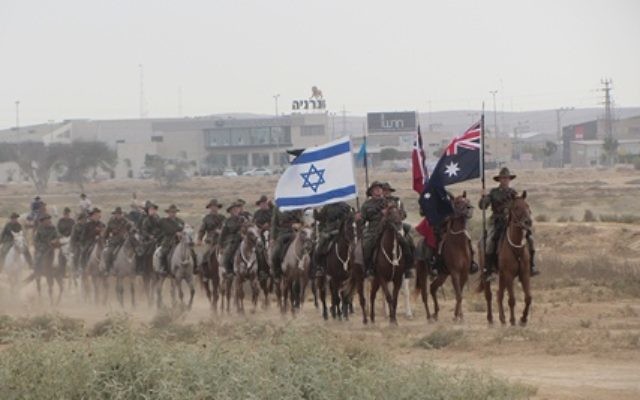Israel, Australia talk shared security concerns
In a partnership between the Australian Strategic Policy Institute and the International Institute for Counter-Terrorism at Reichman University, delegations from Australia and Israel met online recently for the seventh annual Be'er Sheva Dialogue.

Israel and Australia face rapidly changing security environments, with growing militarisation in their respective regions. Both nations are targets for terrorist attacks and are trying to meet the challenges of a more belligerent China. These issues were canvassed when delegations from Australia and Israel met online recently for the seventh annual Be’er Sheva Dialogue.
Named after the site of the Battle of Be’er Sheva, the dialogue is a partnership between the Australian Strategic Policy Institute and the International Institute for Counter-Terrorism at Reichman University and brings together officials, parliamentarians and analysts from both nations.
In his message to the dialogue, Australian Defence Minister Peter Dutton said the protection of Australia goes well beyond our shores so that Australia is safer and more secure “when Israel is safe behind secure, internationally-recognised borders”.
The minister observed that the two states were now experiencing “grey-zone” activities which fall short of armed conflict but are designed to irritate, intimidate and injure, such as cyber attacks, trade interference, campaigns of disinformation, the use of paramilitary forces and the militarisation of disputed features.
“We’re friends, and we’ve always stood together and always will”, the minister said.
Israel’s Deputy Prime Minister and Defence Minister Benny Gantz said the dialogue highlighted the strong strategic ties between the two countries based on shared democratic values and common interests. He suggested that there’s scope to expand defence cooperation. Gantz thanked Australia for supporting the Abraham Accords and suggested they be expanded to additional states in the region.
On counter-terrorism, dialogue participants discussed the way the Taliban victory in Afghanistan has given a boost to the extremist movement globally with terrorist networks spreading in the Middle East, the Sahel, sub-Saharan Africa, the Horn of Africa and Southeast Asia. Dialogue delegates discussed how the Taliban’s victory was emboldening Iran, Russia and China.
There was a lively discussion of the strange partnerships developing between far-right groups inspired by the Taliban and Islamist groups. Delegates from both sides suggested the political reality was that right-wing extremism is a direct threat to democracy, not just security: these extremist groups claim to defend the rights and interests of the majority.
Several Israeli delegates welcomed Australia’s recent support for Israel in the fight against terrorism by the Australian government listing Hezbollah as a “terrorist organisation”, extending an existing ban on armed units to the entire organisation.
Iran’s growing regional belligerence and the ongoing talks over a return to the JCPOA nuclear agreement was raised. Several Israeli speakers expressed concern over what they saw as a rushed attempt by the US to revive the JCPOA.
On China, Australian delegates suggested Australia had been “the canary in the coalmine” in terms of being on the receiving end of China’s coercion. Israeli participants suggested Israel was only now beginning to grapple with the implications of China assuming superpower status and how this will play out in the Middle East. China is Israel’s third biggest trading partner, after the US and the EU, and has an increasing interest in Israeli technology.
Israeli delegates noted there were concerns in Washington over China’s growing engagement with Israel. Israel has signalled to the US that it is listening. It’s moved its recently established foreign investment vetting committee to the National Security Council, directly under Prime Minister Naftali Bennett’s control. Both sides agreed that Australia’s experiences can play an important role in informing Israeli policy on China.
One Australian participant suggested that Australia should work more closely with Israel in the Pacific, noting the good will towards Israel in the Pacific Islands region. Israel might consider basing its Ambassador to the Pacific Islands in the region, rather than in Jerusalem. It was suggested Israel could work with Australia on water and agriculture projects in the islands. It might establish an incubator for app development in the Pacific. Israel also has a lot to offer in e-commerce security systems with many blockchain projects and digital currencies being developed in the region. Training packages could be developed by the IDF for militaries in PNG, Fiji and Tonga.
On the QUAD grouping, (India, Japan, US and Australia), several Australian delegates observed the QUAD was gaining momentum and putting emphasis on critical technologies. It was suggested Israel could contribute to the QUAD’s work here. The barriers to entry to the QUAD are likely lower than AUKUS, that in some ways is a subset of the “Five Eyes” intelligence sharing group. But one Australian participant also suggested the critical technology stream in AUKUS is a blank slate and Israel could collaborate in areas such as cyber security and artificial intelligence
An Australian delegate suggested there’s an opportunity for an AUKUS-plus type agreement between Australia and Israel. The UK and Israel have just concluded a 10-year plan for deepening ties in areas such as cyber security, artificial intelligence and quantum computing.
Participants agreed that the UK-Israel MOU could be a model for Australia and Israel to identify and deliver new capabilities. In this context, there was a recommendation that there should be a ministerial bilateral convened in the first half of 2022 to settle the terms of a new wide-ranging defence and security cooperation agreement between the two countries.
Dr Anthony Bergin is a senior fellow at the Australian Strategic Policy Institute. He is lead author of The Wattle and the Olive: A new chapter in Australia and Israel working together published by ASPI.

comments